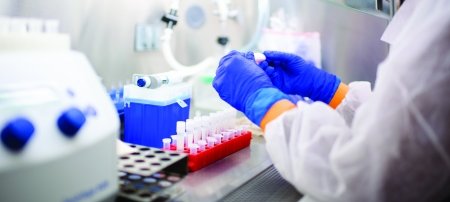High-brightness fluorophores (HBFs). A biomedical start-up. Small business technology transfer. This is how commercialization grows from basic research.
In 2014, physics professor Yoke Khin Yap started Stabilux Biosciences, a spin-off company of Michigan Technological University. What started as a deep dive into academic research during a sabbatical — focusing on the peculiar physics of nanomaterials — evolved into a product ready for commercialization.
About the Researcher
One day, it could help doctors in Michigan hospitals and around the world quickly detect, diagnose and monitor blood diseases, elusive cancers, infections and other biomarkers.
Over the next year, Yap and his tech team, led by Nazmiye Yapici, plan to commercialize NovoluxTM, a high-brightness dye that uses vivid colors to sort out different biomarkers in immune cells. Basically, if a disease is present in a body, the population of biomarkers in blood cells will change. NovoluxTM dyes make those immune cells light up — brightly — showing which are present and in what quantity. This includes rare biomarkers that were previously undetectable because of low population or rarity. Such a magical performance is due to the tunable fluorescence brightness of the NovoluxTM dyes, which can be a few hundred times brighter than regular fluorescent dyes currently on the market.
The progress of NovoluxTM stems from support that started with the Michigan Economic Development Corporation (MEDC) and the National Science Foundation (NSF) I-Corps and the Small Business Technology Transfer (STTR) programs. Now, the Stabilux team received a supplementary Technology Enhancement for Commercial Partnerships (TECP) NSF grant. This is one of several supplementary phase II awards under the STTR program, bringing the total funding from NSF STTR to more than $1.1 million. Alongside additional state funding and University support through the Michigan Tech Entrepreneurial Support Corp (MTESC) and Superior Innovations, the investment in the technology has reached more than $2.6 million.
Steve Tokarz (CEO) and lead scientist Nazmiye Yapici of Stabilux Biosciences are Yap’s close collaborators. In June, the team will be presenting the company’s work at the CYTO 2020, a major international conference on flow cytometry technology.
Michigan Technological University is an R1 public research university founded in 1885 in Houghton, and is home to nearly 7,500 students from more than 60 countries around the world. Consistently ranked among the best universities in the country for return on investment, Michigan's flagship technological university offers more than 120 undergraduate and graduate degree programs in science and technology, engineering, computing, forestry, business, health professions, humanities, mathematics, social sciences, and the arts. The rural campus is situated just miles from Lake Superior in Michigan's Upper Peninsula, offering year-round opportunities for outdoor adventure.










Comments